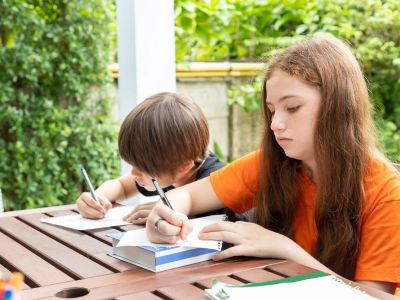There are actually a number of garden related activities you can do that can help build your child’s language and writing skills, and even tie into social studies while using the garden.
Language/Literacy in the Garden
Young children can practice writing letters by using a stick or even just their finger to make letters in the dirt or soil. They can be given letter cards to use or you can tell them a letter to write, which also helps with letter recognition. Older children can practice writing vocabulary, spelling, or garden words. Going on a hunt to find things in the garden that begin with each letter (such as Ant, Bee, and Caterpillar for A, B, and C) helps with pre-emergent reading and writing skills. You could even start an alphabet garden using plants beginning with certain letters grown there. Reading plant labels and seed packets builds on language development. Children can even create their own labels to place in the garden. To further expand on writing skills, have your children write about something correlating to your family’s personal garden, something they did or learned in the garden, or an imaginative garden tale. Of course, finding a cozy garden spot to write will also make the task more enjoyable. Smaller kids can be involved as well by having them create a drawing or picture and then verbally telling you about their story and what they drew. Writing down what they say and reading it back to them helps make a connection between spoken and written words.
Literacy Resources
There are tons of songs, fingerplays, and books about or related to gardening available to use as extra resources. A quick internet search can help with some cute and catchy garden tunes. Although visiting the library may not always be an option, many libraries are allowing those with a library card to check out e-books. Check with your local area to see if this is an option. There are also many digital books free for download. Something as simple as reading or having outdoor story time can be beneficial for your child’s language and literacy development.
Social Studies and Gardening
Social studies in the garden can be a little bit harder to accomplish but can be done. You may have to do a little research of your own beforehand. Although we won’t go in depth here, we can give you some topics to search on or give your children a project of researching and collecting facts about a topic. You can certainly come up with more, but a few ideas to get you started include:
History of food or origins of different fruits, veggies, and plantsAround the world gardens – different areas such as Zen gardens in Japan or Mediterranean desert gardeningPopular garden techniques in other cultures – one example being rice paddies in ChinaOrigins of plant common names – for added fun, choose silly plant names or names from your own garden History and information about farm/garden inventions and their creatorsHave a Native American garden by planting companion crops like the Three SistersCreate a timeline and study the way gardening has evolved over timeCareers related to or tying into gardening
Virtual Gardening Learning
Although social distancing and staying home are encouraged right now, there are still ways to get involved in gardening with friends and extended family members. Try virtual gardening. Thanks to technology, you can be miles, states, even continents away from those you love and still enjoy quality time “planting with Nana.” Video chat and plant together, make a video garden diary, vlog to share with others, or have a competition garden and compare results with friends. Get creative and get those kids out of the house and into the garden!
